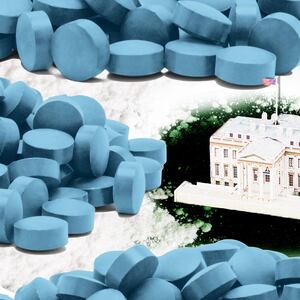Tim Bergling was about to enter his second year of high school when he took his first hit of a friend’s joint. He immediately hated it. The teenager–who in a few years’ time would become internationally known as the EDM DJ Avicii–suddenly felt his throat turn scratchy and dry from the intake of marijuana, as his heart started pounding and paranoia crept in.
The sensation eventually passed, but when Avicii returned home to Stockholm after his summer trip to the French Riviera with his buddies, an unsettling feeling of derealization washed over him. Panicked and worried that the marijuana had brought on some form of psychosis, he confided in his parents about what he had done and how he no longer felt connected to the world around him.
They took him to a child psychologist, who squashed Avicii’s fears and assured him he was fine. His parents were proud that their teenage son trusted them enough to disclose his experimentation with drugs and had sought out help when he believed something was seriously wrong.
ADVERTISEMENT
“There is one good thing about this,” Avicii’s mother, Anki Bergling, told her husband, Klas Bergling, at the time. “We never have to worry about Tim falling for drugs.”
But just a few years later, at the height of his fame, Avicii had fallen victim to a crippling opioid addiction, the breaking point coming after a handful of emergency hospitalizations where medics pumped his stomach clean from the cocktail of painkillers, antidepressants, sedatives, and anti-anxiety meds that he had ingested.
Things had turned so dire that his family members, childhood friends, and business team staged an intervention in the summer of 2015 following a series of gigs on the Spanish party island of Ibiza, in a last-ditch attempt to help him get clean.
And it seemed to work. Avicii agreed to undergo treatment at Ibiza Calm, a tranquil facility where program prices stretch to more than $13,400 per week. After a month of intensive care, he emerged a new man. By the spring of 2016, he declared he would no longer be performing live due to the intensive touring schedule he had endured over the past few years, instead choosing to prioritize his health and focus on what he loved most: making music. He was armed with a new mindset and sense of purpose, even turning to various spiritual teachers for guidance.
And yet, the unthinkable happened in April 2018, when Avicii took his own life at the age of 28.
“It was naive,” Klas Bergling told The Sunday Times earlier this month, ahead of the January 2022 release of Tim―The Official Biography of Avicii. Just because an intervention had been staged and his son seemed to beat his addiction didn’t mean the worst was over, his father added.
“I’ve heard a thousand times that the fight starts when you’re sober.”
Avicii’s shocking death made international news. The Swedish DJ had been integral in ushering electronic dance music into the mainstream, bringing the genre to the masses alongside peers like Swedish House Mafia, Tiësto, David Guetta, and Calvin Harris. Virtually overnight, Avicii went from a teenager who fiddled around with sounds and beats on a pirated download of music engineering software to a superstar with a string of international hits, including “Levels,” “Wake Me Up,” “Hey Brother,” and co-writing and co-producing Coldplay’s “Sky Full of Stars.”
But despite his worldwide fame, boundary-pushing talent, a $15 million Los Angeles mansion down the road from Leonardo DiCaprio, millions of worshipping fans, and a solid support system that included his family, a loving girlfriend, and lifelong friends, Avicii relied on substances to keep his battles with anxiety and depression at bay. And when those substances were removed, he struggled with the idea of who he was and what his life really meant.
Tim―The Official Biography of Avicii author Måns Mosesson spoke with Avicii’s family, friends, former girlfriends, colleagues, and industry peers to tell the DJ’s life story. In doing so, he sheds light on how the young musician fell down the rabbit hole of addiction while trying to avoid facing his mental health struggles, culminating in his tragic death.
In journal entries kept by the late DJ while he was in rehab, Avicii detailed his battle against depression and anxiety, explaining how his alcohol abuse and drug addiction served as a coping mechanism to escape what was happening inside his head.
As a child, Avicii struggled with severe anxiety, often fearing that a nonexistent lump was actually an early sign of cancer. He fretted about his appearance, having particular disdain for his nose. When he developed acne as a teen, he would skip school on days that his skin was flaring up and stay inside on the weekends, describing his skin woes as having “a huge impact on [my] self-esteem.” (He eventually found a salve in 2010 with the medication Tetralysal, an antibiotic that in rare cases can lead to inflammation of the pancreas, according to Mosesson’s book.)
“He was a shy person,” Klas explained in an interview with the U.K. Sunday Times. “He wasn’t the one that went into a room with lots of people and started talking or holding speeches.”
But to be a successful and marketable DJ, there’s no room for shyness. Not only were you expected to develop a setlist of synthy and remixed tracks that would build the crowd up before dropping the bass to send them into a euphoric tizzy—you needed to be a presence on stage that would help sell out hundreds of venues a year.
In a career devoted to the nightlife scene, gigs often start around midnight and carry on until well after dawn, notoriously fueled by copious amounts of booze and drugs. Club appearances are a given, where you pass the time by toasting with promoters before hopping on a plane to do it all over again the next night.
For Avicii—who struggled with self-image issues and once had a panic attack when he was recognized by a horde of fans while trying to catch a screening of Transformers—alcohol became a constant, giving him that extra confidence to get on stage in front of thousands of people and deliver an epic show.
Even as a teen, while still performing at small cafes and school dances, Avicii worried about how his drinking might affect his mental health. “I’m worried about losing control of myself when I’m tipsy,” he wrote on a forum board.
“Have never had these kinds of problems before but I’m worried that my anxiety will increase when I get drunk and that I’ll feel like nothing matters and take my life or something.”
Avicii’s dangerous relationship with alcohol was no secret. In the 2017 documentary Avicii: True Stories about his grueling life on the road, the musician admitted his reliance on the substance had spiraled into something much more serious, as he regularly downed drinks to steady his nerves. Coupled with the excessive drinking was his relentless touring schedule–he took on as many as 300 gigs in a single year–but with the machine whirling around him, Avicii never felt he had the power to say no.
“It feels like I’m going to faint every single day now,” Avicii wrote around 2011 to his manager Arash Pournouri. “And not just today and this tour but from about the first time I mentioned that I felt worn-out… pretty regularly but I push it back down and chose to not bring it up because there’s nothing I can do about it.”
Things came to a head in January 2012, when the then-22-year-old was rushed to the hospital after experiencing debilitating pain ripping through his stomach. Doctors determined it was pancreatitis, citing his excessive drinking and the acne medication he had recently taken as the triggers. Their advice was to stay sober for at least six months and to ditch any fatty junk foods; otherwise the inflammation in his stomach would not properly heal. And if it didn’t heal, he ran the high chance of enduring chronic pain for the rest of his life.
“I had a hard time accepting never drinking again though strongly suggested from all doctors to wait at least a year before even having a beer,” Avicii wrote in his journal.
“Of course, I didn’t listen to the majority of the doctors, I listened to the couple who said it was ok if I was careful. I was ignorant and naive and touring the world, still on the never-ending tour – because once you’ve circled it once, guess what? You start right back over again.”
The stress-free time away from work was a godsend, only made easier by the painkillers he was prescribed while recovering at a hospital in New York. Upon being discharged, he was sent home with a prescription for oxycodone to help manage the pain, which set off a dangerous addiction.
“Those days in hospital were the most anxiety and stress-free days I can remember the past 6 years, those were my true vacations, as depressing as it might sound,” Avicii wrote in his diary. “The relief of going from extreme pain to none, knowing that no one is expecting anything other than for you to wait it out (which is the only way of treating pancreatitis) and then recover was huge. It was an extreme relief considering the insane schedule I had kept up until that point.”
But it wasn’t long before Avicii was thrust back into his hectic touring schedule. Old habits crept back in while he was living on the road, as he began eating junk food or nothing at all, drinking again, not sleeping, and, now, popping painkillers to deal with the side effects of his lifestyle.
The next year, in February 2013, while flying into Australia for a series of shows, Avicii was once again gripped by an excruciating pain in his stomach and rushed from his plane to the emergency room. Not only was his pancreas inflamed again, but doctors also recommended that he undergo surgery to remove his gallbladder.
But Avicii declined the operation, insisting he would only do it once his schedule eased up. Again, he was prescribed painkillers to help manage any flare-ups. The cycle was repeated the next year, when he was hospitalized again with a ruptured appendix and had to go through with the gallbladder surgery.
He emerged from the third hospitalization with a fresh round of prescriptions, but it would be several more months before his family and friends realized the extent to which he was hooked on the opioids. Avicii started behaving erratically, going off on crazed tangents and growing irritable with loved ones. When his parents tried to slowly wean him off painkillers back in Sweden in 2014, he escaped to Los Angeles, where he had a personal doctor prescribe him medication on demand.
Avicii refused to believe he had a problem, insisting he wasn’t addicted to the pills because he actually hated them. Raquel Bettencourt, his girlfriend at the time, was concerned about the amount of painkillers he was taking, and recorded a conversation with him so she could later show him how much he was slurring his words.
“So, you don’t think that the medication has control over your body whatsoever?” she asked him.
“Well, yeah. Of my body, not my mind,” he responded.
“I think they both go hand in hand,” Bettencourt said.
“I don’t think so. Because if they did, I wouldn’t be taking four milligrams a day. I’d be taking more,” Avicii replied.
The tipping point came after two back-to-back incidents in the winter of 2014 where Avicii’s stomach needed to be pumped after downing booze and consuming an array of pills, including muscle relaxers and panic disorder medication.
Following a gig in Ibiza the following summer, his family and friends staged an intervention where Avicii was forced to face the truth. While in rehab, he came to the realization that he had latched onto drugs and alcohol as a coping mechanism for stress, anxiety, and depression.
“It needed to be explained to me very logically and caveman-esque for me to truly understand its nature and how it was harming me,” he wrote in the journal he kept at rehab. “Ouch, pain. Why me pain now? Uncomfortable feeling. Future Tim deal with pain. Future Tim deal with pain better than present Tim because already there’s too many present pains more urgent to deal with.”
Leaving rehab with a newfound perspective, Avicii embraced a new era of his life. He read fervently about Carl Jung’s theories, regularly meditated, traveled to Arizona’s Monument Valley with friends, bought a new puppy, and tried to better understand himself by taking personality tests.
When he turned up to Miami’s Ultra Music Festival in March 2016, it would be his first performance in months. Even before he took the stage, he had already decided he no longer wanted to perform live. The official announcement came a few days later, and after wrapping up some shows that he couldn’t drop out of, Avicii took the stage for the last time in August 2016.
In the last two years of his life, Avicii seemed to be in a stable place, but bubbling beneath the surface were problems he had long tried to suppress. For starters, he became uninterested in the music he was making and producing, canceling meetings at the last minute with legendary producer Quincy Jones and passing on song demos that would eventually turn into massive hits for other artists.
He occasionally drank, frequently smoked weed, and sometimes took mushrooms and other psychedelic drugs. “Kind of like I understand the universe but hard to not really grasp it,” he told a friend about a drug trip. “Feels a bit like going crazy.”
While he had begun a new relationship with model Tereza Kačerová and even became close with her two-year-old son, the two constantly bickered. “I’m just having like an existential crisis,” he told her about feeling depressed. “What if everyone around me is just a projection in my mind? Sometimes I just think about these things. About how nothing really matters.”
Meanwhile, the new music he was working on seemed to paint him as a troubled soul searching for answers. The lyrics to what would become his song “Freak” read, “I don’t want to be seen in this shape I’m in / I don’t want you to see how depressed I’ve been / You were never the high one, never wanted to die young / I don’t want you to see all the scars within.”
In April 2018, Avicii agreed to travel with some friends to Oman, a country on the southeastern coast of the Arabian Peninsula. Excited about the trip and the peaceful locale, he messaged a friend a few days before the vacation about how he felt he had overcome some of his inner turmoil.
“The second u start clearing all the nonsense out your mind – which u only can do with meditation (not TM specifically but any meditation!!!) all the other parts fix themselves,” he wrote. “For instance, I’ve been for 10 years thinking I need to fix something in order to be happy/confident but in reality, I know now I only need to ‘exercise’ my brain with meditation and I will be happy, and the rest will follow.”
On the trip, Avicii began practicing a deep form of meditation taught by Maharishi Mahesh Yogi to reach the deepest state of consciousness, or enlightenment, where there would be no more suffering. In his teachings, one could achieve this level of “cosmic consciousness in five to eight years.”
But Avicii was determined to reach that point sooner, telling his friends that he was meditating for hours and hours, rather than the instructed 20 minutes at a time. Sometime during the trip, Avicii took a turn, telling his former therapist in Ibiza that he was confused from his meditation.
“It feels like I am in a new default mode of being which is very new and a little bit scary,’ he wrote. “It felt like the fears the last couple of days caused havoc in me, but I remember the tip to focus on my breathing.”
Days later, on April 19, his father received a call from someone Avicii had met on the trip, who expressed concern that the musician was spending his entire day meditating. They added that Avicii wasn’t speaking, was often crying, and refused to eat or take shade from the blistering sun. He had also injured himself, although not seriously. The next day, the man called Klas back. Avicii had taken his life.
Avicii’s father told author Mosesson that he still can’t make complete sense of what happened to his son. Notes jotted in Avicii’s phone following his hours of meditation seem to hint at a man lost in his own head.
“We need to feel strong fear sometimes and strong suffering to grow!” he wrote in one note.
“Aaaaaaah but I’m still trying to figure everything out all the time, I need to be OK with sitting by myself… I need to learn how to handle those emotions,” another note reads.
And in what would become one of his final messages—as recounted in Mosesson’s book—the tortured musician wrote: “The shedding of the soul is the last attachment, before it restarts!”
If you or a loved one are struggling with suicidal thoughts, please reach out to the National Suicide Prevention Lifeline at 1-800-273-TALK (8255), or contact the Crisis Text Line by texting TALK to 741741.








